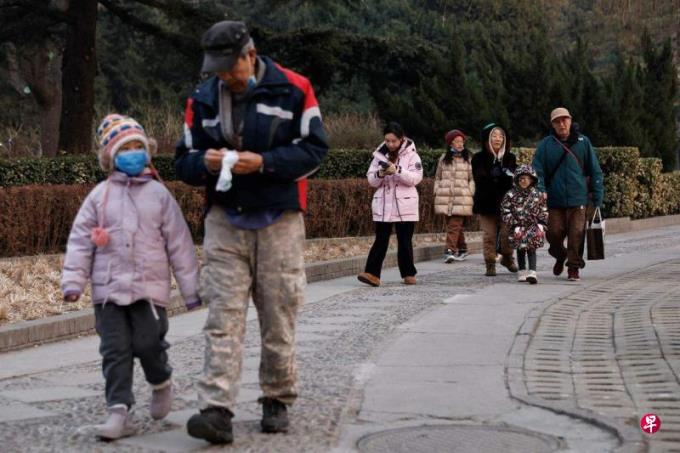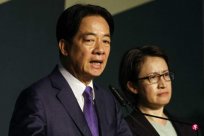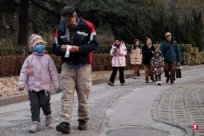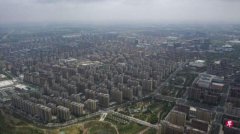
The total population of China has declined for two consecutive years, and the decline has further expanded, highlighting the long -term risks faced by this traditional population country, which has continued to increase, further intensifying the outside world's concerns about China's economic prospects.
The data released by the National Bureau of Statistics of China on Wednesday (January 17) shows that at the end of 2023, the national population was 1.4096.7 billion, a decrease of 2.08 million from the previous year.The Chinese population decreased by 850,000 year -on -year at the end of 2022, the first negative growth since the Great Famine in 1961.
As the first year after the prevention and control of the crown disease, the number of deaths in China in 2023 increased by 690,000 to 11.1 million, the highest level since 1960.The population of the newborn has further dropped from 9.56 million in 2022 to 9.02 million, the lowest level since the founding of the Communist Party of China in 1949.
From the perspective of age composition, the proportion of labor -age population 16 to 59 has decreased from 62%in 2022 to 61.3%, and the proportion of population 60 and over rose from 19.8%to 21.1%. The aging trendFurthermore.
Shen Meng, director of Xiang Song Capital, pointed out to Bloomberg that the decline in population aging and birth rate will lead to structural changes in China's economic growth, especially in the field of consumption, and officials have not yet formulated comprehensive development policies for related fields.
Xie Dongming, director of the Research Director of the Greater China of Singapore Overseas Chinese Bank, was analyzed during an interview with Lianhe Zaobao that the trend of population decreased in the short term has little impact on China's economy.Market confidence."Officials should increase economic stimulus and boost confidence by improving the fundamentals."
China's economic growth continued to slow down in the second half of last year.Data released on Wednesday showed that the domestic GDP (GDP) increased by 5.2 % in the fourth quarter of last year, slightly lower than the market expectations of 5.3 %.
The day before, Chinese Prime Minister Li Qiang disclosed in advance at the Davos Forum in Switzerland, Last year, China's GDP increased by 5.2%, a official goal of about 5%.However, the downturn in the property market and the lack of domestic demand continued to restrict economic growth.
The price of new housing in China has fallen for six consecutive months. In December, the price index of newly -built residential houses in 70 large and medium cities across the country decreased by 0.45%month -on -month./Story20240117-1462719 "rel = nofollow target = _blank> the largest in the past nine years. .The area of residential sales in the whole year fell by 8.5 %, and the new start area decreased by 20.9 %.
Real estate development investment has fallen for two consecutive years, a year -on -year decrease of 9.6%.With this dragging, the annual fixed asset investment increased by 3 %, the lowest increase in three years.
The total retail sales of consumer goods throughout the year increased by 7.2%, but the total increase in the zero of the community in December slowed down to 7.4%year -on -year, lower than market expectations. resident consumer price index (CPI) increased only 0.2% throughout the year,Far official goals of about 3%.
Kang Yi, director of the National Bureau of Statistics of China, frankly admitted at a press conference on Wednesday that the low price operation reflected to a certain extent that the effective demand was insufficient, but he expected to promote the introduction and implementation of consumer policies with relevant expansion needs, and the demand was insufficient.The problem will gradually alleviate, and the price will rise moderately this year.
Analysts generally predict that the official economic growth goal this year will still be set at about 5 %.Xie Dongming pointed out that at least it is necessary to maintain this growth rate in order to pull back the stalling Chinese economy back to the potential growth range.But this year, the economy has faced contraction, capital outflow, and US election and so on.A series of risks, superimposing the higher reference last year, making this year's "guarantee 5" more difficult.
Wang Jun, chief economist of Huatai Assets, also pointed out in the interview that in the face of multiple pressures, this year's economic demand policies have more comprehensive and stronger support, thereby stabilizing the property market, foreign capital and consumption fields.He expects the central bank to surrender and restore interest rates after the Lunar New Year.
Bloomberg quoted people familiar with the matter and revealed that China considers the issuance of 100 trillion yuan (S $ 190.8 billion) this year's ultra -long -term special Treasury bonds to further increase fiscal stimulus.
The lack of data was dragged down, and the Lugang stock market fell on Wednesday.The A -share blue chip Shanghai and Shenzhen 300 index closed 2.18 % low, down to the lowest level in the past five years; the Shanghai Composite Index slipped 2.09 %, and the Hong Kong Hang Seng Index fell 3.71 %.




